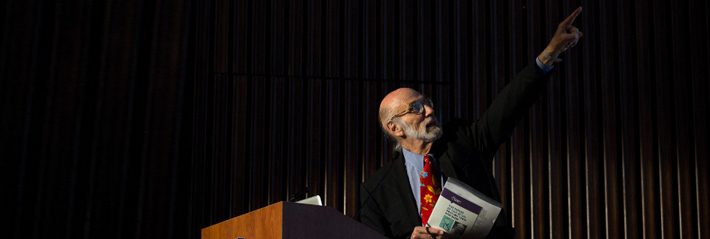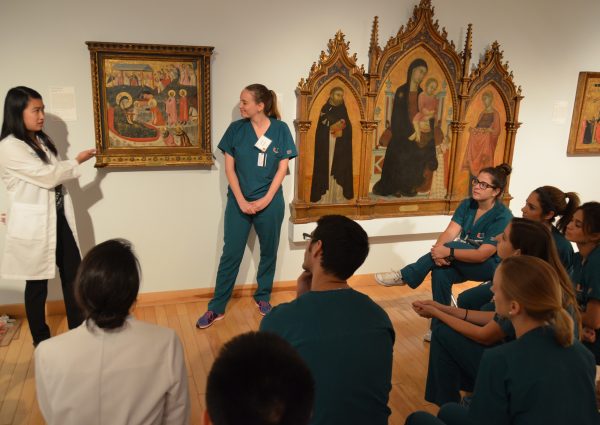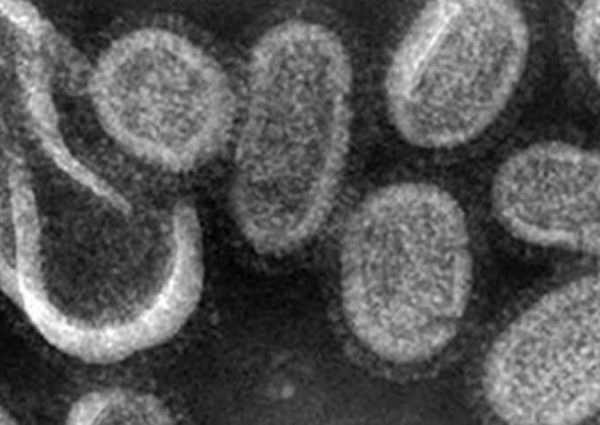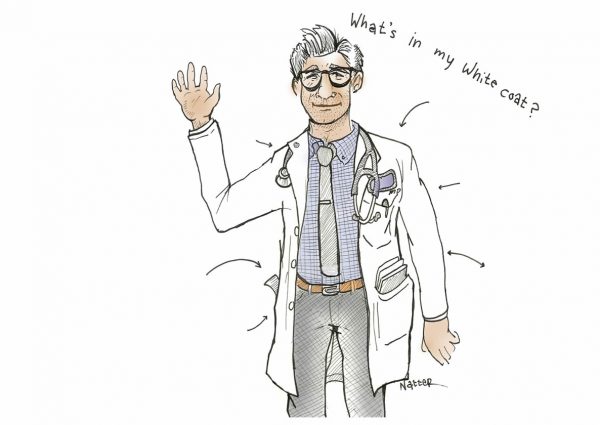By Shawn Thomas, NYUSOM Class of 2021 and Rudin Fellow
It was a full house in Farkas auditorium, as the audience buzzed with excitement for an event 40 years in the making. People were gathered to celebrate The House of God, a work of fiction that laid bare some of the darker aspects of the medical profession and can be perceived as a harbinger of many reforms of the ensuing years. Held on Thursday, December 6, 2018 on NYU Langone Health’s main campus, the evening included panels featuring not just the novel’s author, Samuel Shem, but several of the real people on whose much younger selves the characters in the book were based.
Samuel Shem, pen-name of Stephen Bergman, MD PhD, developed a reputation as a maverick after the publication of his novel drew the ire of Harvard University and its associated medical institutions, namely Beth Israel Hospital, the establishment caricatured as the eponymous hospital of Shem’s novel. Now having sold over two million copies, the hugely popular best-seller drew a large crowd to the event, all eager to hear Shem’s reflections on the legacy of his writings. The spectacular showing was perhaps partially owed to an audience waiting hopefully for the Beth Israel renegade to make at least a few fiery comments on the eve of the 40th anniversary celebration of his novel.
An opportunity for such a moment presented itself in the evening’s first panel, featuring Arthur Caplan, PhD; Rita Charon, MD; and Shem, with Steven Abramson, MD, senior vice president and vice dean for education, faculty and academic affairs, moderating the discussion. Dr. Caplan, director of the Division of Medical Ethics at NYU Langone, began with some comments regarding the intersection of his work in medical ethics and the inhumane medical climate described in The House of God. In fact, it was this very climate that served as an impetus for him to pursue his current field of study. Dr. Charon, professor of medicine and founder and executive director of the Program in Narrative Medicine at Columbia University, more directly addressed the content in Shem’s novel. Having trained at Beth Israel herself, she took issue with the ghastly descriptions of intern life at the hospital, insisting that while The House of God may have represented a particular experience, it most certainly did not embody the whole truth, which also consisted of her own, very positive intern experience at the hospital.
Shem conceded that in writing the novel, he created a world that was “one step off the truth”, a maneuver which he described as necessary to overcome the dilution which occurs when real-life experiences are transcribed into written word. Yet he made no concessions about the depraved environment which led him to publish his experiences in what would eventually become The House of God. That being said, when asked whether he prefers his intern experience to that of interns today, he was unequivocal in his loathing for the modern intern experience, alluding to doctors’ enslavement to the electronic medical record as the greatest challenge facing physicians today. Dr. Charon offered some pushback on this point, cautioning against the nostalgia for the so-called “good-old days” of medicine. She noted that modern medicine, even with its flaws, has brought with it overwhelmingly positive changes for both hospital workers and patients alike.
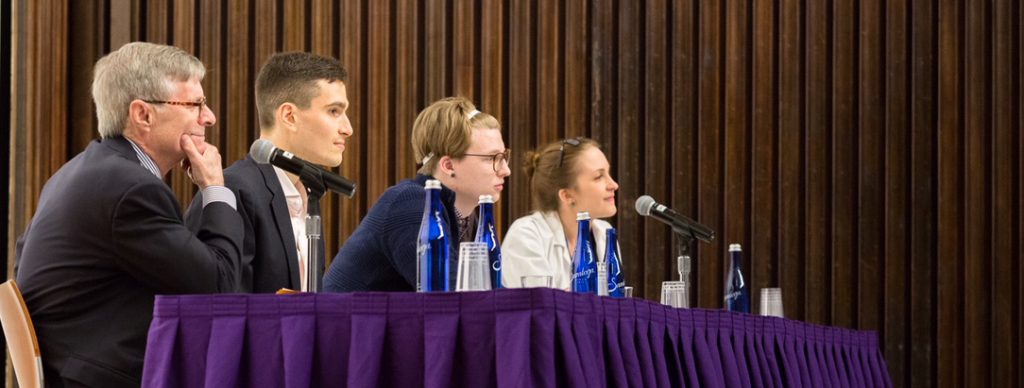
The second panel, “Enduring Impact,” featured NYU medical students Dustin Brinker and Eli Cahan, as well as Kate Otto Chebly, MD, a resident physician in internal medicine hereat NYU Langone. David Oshinsky, PhD, director of the Division of Medical Humanities, moderated the discussion. The group talked about how The House of God influenced them as they began their training. Though the book is now 40 years removed from its original publication, many of its themes continue to ring true with physicians-in-training today. The discussion also turned to the role of physician-writers in shaping the medical field, as Dr. Oshinsky and Cahan, both published authors, offered advice to current and aspiring writers in attendance that evening.
The final and perhaps most anticipated panel of the evening featured Shem, along with the real-life counterparts of the characters in his novel. The descriptions of his compatriots, while fictionalized for the novel, were often unflattering and bordering on incriminating. In addition, the novel made several allusions to the rocky course of his relationship with his then girlfriend, now wife, Janet Surrey, PhD, fictionalized as the character “Berry” in The House of God. The book even contained passages which not-so-subtly implied his infidelity during his time at Beth Israel. Taken together, many people were shocked that these characters actually agreed to attend an event which featured a man who made a career out of ridiculing their unsavory attitudes and behaviors.
Contrary to expectations, the characters present for the final panel were remarkably cordial. The discussion had the feel of a long-overdue reunion, with some of the more upbeat characters, such as Richard Anderson, MD (“Eat My Dust Eddie”) and Jonathan Ritvo, MD (“The Runt”) eagerly sharing stories of their intern year, and the occasional amusement they derive these days from mentioning their roles in the novel at cocktail parties. As each character took the microphone, they expressed a shared sense of camaraderie with their fellow interns, intertwined with some nervous chuckling and collar loosening as they playfully denied their purported behaviors described in the novel. Dr. Walter Eades (“Chuck”), had perhaps the most favorable characterization in the book, and true to his character, he came off as a cool, collected man of few words. Then again, he had much less to do in the way of defending himself.
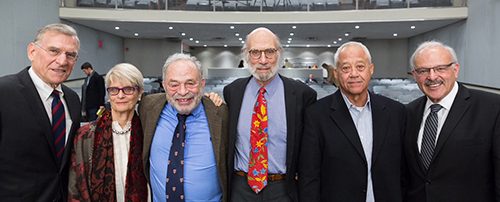
As the event concluded, those who had come seeking further controversy out of Shem may have walked away disappointed. The themes of the novel surely continue to strike a nerve in some, but now four decades removed from his experience, Shem seems to have made peace with his legacy. As he said during the event, “if you live long enough, the people who hate you either die or retire.” Certainly his comrades from The House of God are excluded from this group, if their on-stage rapport was any indication. At the same time, while the main cast may not openly take offense to their lampooning in The House of God, one cannot help but wonder whether they have, at this point, become prisoners to their unexpected fame.
are excluded from this group, if their on-stage rapport was any indication. At the same time, while the main cast may not openly take offense to their lampooning in The House of God, one cannot help but wonder whether they have, at this point, become prisoners to their unexpected fame.

